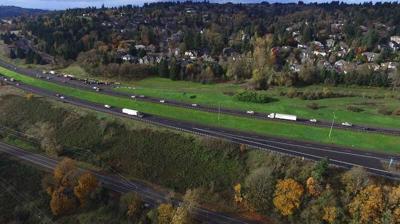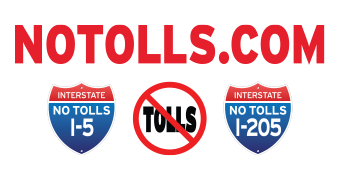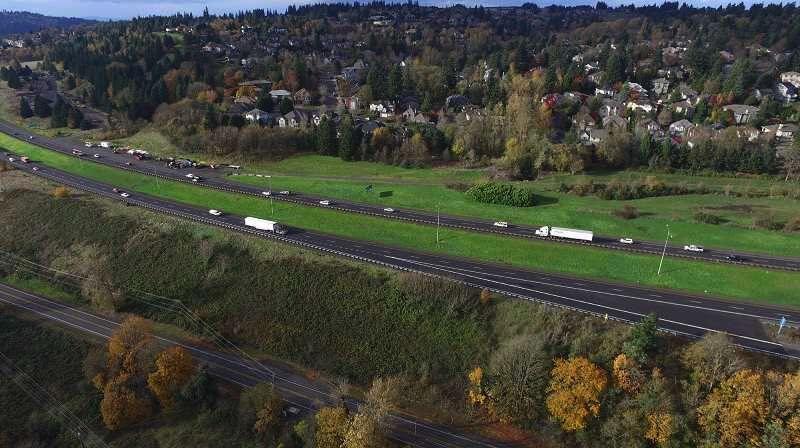My View: Time to pump the brakes on ODOT tolling plan
- By Dan Occhipinti
- (Portland Tribune)

Sometimes you need to slow down to avoid a mistake. A perfect example of this is ODOT’s runaway plan to toll all lanes of I-5 and I-205 in the Portland metro area.
The decision to allow ODOT to implement tolls was never given the careful consideration it deserved. In 2017, the Legislature passed a sweeping funding package that made much-needed investments to our transportation system. Unfortunately, buried on page 107 of that bill was an obscure provision giving ODOT unprecedented authority to exact tolls anywhere in the state it sees fit. Despite holding seven public meetings on the bill, the Transportation Committee never debated that provision, and its very existence is hardly referenced anywhere in the legislative record.
That obscure section of law that received virtually no attention has now exploded into a plan by ODOT to encircle the entire Portland metro area with tolls on every mile of every lane of I-5 and I-205, intended (according to ODOT) to bolster sagging gas tax revenue and reduce freeway congestion. Portland is first, but Salem, Eugene and Bend should take notice.
The damaging side effects of ODOT’s plan are widely acknowledged. Local streets will be unable to handle the overload of diverted traffic, and public transit is not available in many places. Pollution will increase in residential neighborhoods. Intersections will fail; pedestrian safety is in question. These and other concerns have been raised repeatedly by city and county leaders and frustrated citizens alike — concerns that ODOT has been unable or unwilling to adequately address.
Yet ODOT is speeding ahead with plans to start tolling in 2024, regardless of the unintended consequences.
Fortunately, Senator Mark Meek and his colleagues have introduced Senate Bill 933, which would halt the current tolling plan and require ODOT to engage with the Legislature and Oregon voters to objectively evaluate tolling and other viable alternatives so we can make a rational, informed decision.
Funding transportation infrastructure is essential, but doing so with tolling is questionable. Other states have proven that lofty toll revenue projections often fail to materialize, bankrupting tolling authorities or draining money for basic road maintenance to pay construction debts. In Seattle, the new SR99 toll road is already in debt, with utilization now projected to be as much as 30 percent less than forecast just a few years ago. Washington’s state treasurer projects the debt will grow to $237 million, and transportation officials are already asking the legislature to plug the deficit with general fund dollars that were meant for schools, homelessness and health care.
In other states, congestion tolling is applied on “express lanes,” allowing drivers to either pay the toll to get to their destination faster or avoid the toll by remaining on existing lanes. The result is congestion relief on all lanes. Here, ODOT is not going to build any express lanes, and tolls can only be avoided by diverting to surface streets. Tolling I-5 may reduce congestion on the Markham Bridge, but only at the expense of crushing traffic increases on the Hawthorne, Ross Island and Sellwood bridges, to name a few.
Rather than rushing ahead with a woefully incomplete tolling scheme, the Legislature needs to begin in earnest the hard work of reinventing how we fund transportation in the next era.
One option is to replace the gas tax and create a state-wide Vehicle Miles Traveled (VMT) fee instead. Another is to recognize transportation as a utility — especially with the move to an all-electric America — and include a transportation surcharge on electric bills. These are just a couple approaches, all of which face political hurdles and would need time to develop and gain support. But the more you look at the problem, the clearer it becomes that tolling is short sighted and will never solve our problem.
At Pacific Seafood, our team members and drivers will be greatly impacted by the exorbitant costs and increased local traffic resulting from ODOT’s tolling plan. We are grateful to Senator Meek and his colleagues for introducing SB 933, and we hope others will join us in urging the Transportation Committee to bring the bill forward and pump the brakes on ODOT’s tolling plan.
Because whether you are for tolling or against it, slowing down to make a thoughtful and informed decision is in the best interest of all.
Dan Occhipinti is the Chief Legal and Administrative Officer of Pacific Seafood, a food processing and distribution company headquartered in Clackamas, Oregon.


